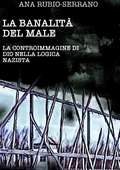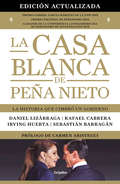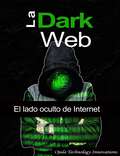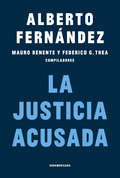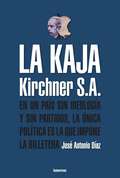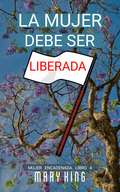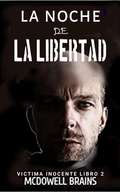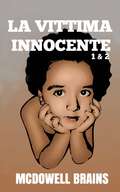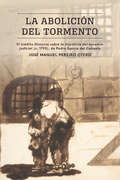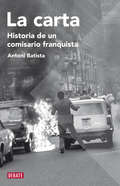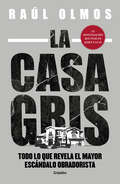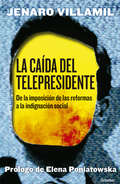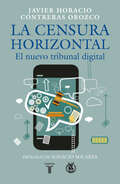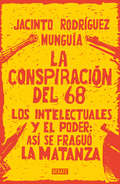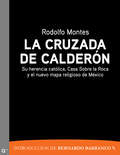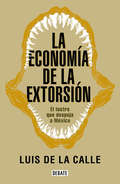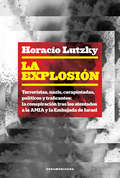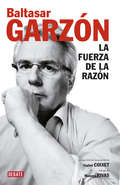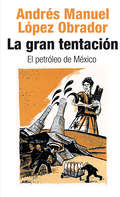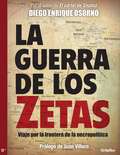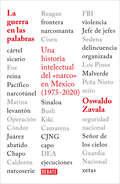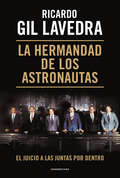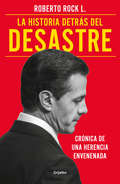- Table View
- List View
La Banalità del Male: La Controimmagine di Dio nella Logica Nazista
by Ana Rubio-SerranoL'obiettivo di questo libro non è mostrare soltanto l'Auschwitz storico, ma piuttosto l'Auschwitz che si è radicato nell'essere umano: la non capacità di distinguere il bene dal male; l'offuscamento per riaffermare la propria identità come la sola umana e l'impossibilità di pensare l'alterità, in modo tale che tutto questo ancora oggi persiste come eredità, della quale il nostro mondo è tanto esecutore testamentario quanto erede. Auschwitz è quindi il punto di partenza ma non il punto di arrivo. È uno studio in cui si mostra il modello di anti-uomo che nasce dall'antropologia nazista contraria al modello di uomo che rivela l'antropologia cristiana. Pubblicazione parziale della sua tesi di dottorato.
La Casa Blanca de Peña Nieto (edición actualizada): La historia que cimbró a un gobierno
by Rafael Cabrera Daniel Lizarraga Irving Huerta Sebastián BarragánNueva edición, actualizada y con capítulos nuevos: ¿qué pasó con la Casa Blanca, símbolo de la corrupción? Premio Gabriel García Márquez de la FNPI 2015 Premio Nacional De Periodismo 2014 Ganador de la Conferencia Latinoamericana de Periodismo de Investigación 2015 En 2015, este libro dejó en evidencia a Enrique Peña Nieto, a su esposa y a su gobierno. Y hoy, esta nueva edición relata qué pasó con la Casa Blanca, con los empresarios vinculados a ella y con la persecución desatada contra los periodistas que la investigaron. Aquí está el mejor retrato de un sexenio doloroso e impune, en el que el primer círculo de poder estuvo más interesado en hacer negocios con particulares que en gobernar. #El enojo [de Enrique Peña Nieto] por ser exhibido es algo que -a diferenciade lo que él recomienda a los padres de Ayotzinapa- no ha podido superar.# Carmen Aristegui
La Dark Web: El lado oculto de Internet
by Ojula Technology InnovationsEl libro actualizado sobre Dark Web y Dark Net. Debe leer este libro si desea aprender o embarcarse en el viaje de la web oscura. En este breve libro, aprenderá las historias escalofriantes de la web oscura y la red oscura. Conocerá los fundamentos, los hechos y las cifras sobre la web superficial, la web profunda y la web oscura. El libro también ofrece una amplia visión general de las amenazas digitales y los delitos informáticos actuales y emergentes. Se le actualizará con información crucial sobre el fraude y el robo de identidad que se llevan a cabo diariamente en la web oscura. En concreto aprenderás: ¿Qué es exactamente la web oscura? El origen de la deep web y la dark web. Actividades que tienen lugar en la dark web Cómo te afecta la dark web. Cómo se venden los datos personales en la dark web Los datos que se comercializan con mayor frecuencia en la dark web Servicios de tráfico de órganos humanos y pornografía infantil en la dark web Los mercados de la web oscura La red Tor y cómo funciona el navegador Tor La historia de Ross William Ulbricht, el hombre detrás de la Ruta de la Seda La verdad sobre Surface Web: por qué no se puede confiar en algunos sitios con su información. Lo más importante que aprenderás: Qué puede hacer para protegerse de actividades maliciosas en la dark web Cómo mantener segura su identidad en Internet a diario.
La Justicia acusada
by Alberto Fernández Mauro Benente Federico G. TheaUn libro que promueve la necesidad de una reforma judicial profunda. Del lawfare a la figura del arrepentido, de la asociación ilícita al memorándum de entendimiento con Irán, La Justicia acusada da cuenta de la dimensión de la crisis de nuestra Justicia y ofrece alternativas de salida. Sin una Justicia independiente del poder político, no hay democracia ni República. Solo existe una corporación de jueces atentos a satisfacer el deseo del poderoso y a castigar sin razón a quienes lo enfrenten. En los últimos años, hemos visto el deterioro judicial, persecuciones indebidas, detenciones arbitrarias inducidas por quienes gobernaban y silenciadas por cierta complacencia mediática. Por eso, este libro viene a manifestar un contundente Nunca más. Nunca más a una Justicia contaminada por servicios de inteligencia, por "operadores judiciales", por procedimientos oscuros y linchamientos mediáticos. Nunca más a una Justicia que decide y persigue según los vientos políticos del poder del momento. Nunca más a una Justicia que es utilizada para saldar discusiones políticas o que judicializa los disensos para eliminar al adversario de turno. Lo digo con la firmeza de una decisión profunda: Nunca más es nunca más. Porque una Justicia demorada y manipulada significa una democracia acosada y denegada.Alberto Fernández
La Kaja: Kirchner S.A
by José Antonio Diaz«"La Kaja" es un libro devastador. Desnuda a un régimen y lo hace conlas herramientas implacables de la información y la razón». PepeEliaschev Desde el día en que Néstor Carlos Kirchner llegó a la presidencia,utilizó la distribución de fondos, la oferta de cargos y laparticipación en la asignación de obras públicas como argumentos paraatraer a gobernadores, legisladores, intendentes, sindicalistas ypiqueteros. Soy porque tengo: esa es la marca de la gestión. La Kaja,así, con K, es el neologismo que define un modo de acumulación derecursos dotado del poder simbólico de la política. Es la base materialdel poder. La fuente de subsistencia. Este libro revela el modo en quela Kaja intimida y doblega voluntades, construye ideologías, paga elmito de la revolución y multiplica las operaciones de perpetuidad.«En estas páginas se ilumina la radiografía más certera y profunda de loque la historia dirá sobre el kirchnerismo». Alfredo Leuco
La Muerta y la Doncella
by Ariel DorfmanLa muerte y la doncella, la obra latinoamericana mas representada en la historia del mundo, ha llegado a constituirse en un clasico sobre la justicia y el perdon, la memoria y el olvido. Dorfman se ha propuesto a explorar preguntas pocas veces hechas en voz alta: "¿Como pueden los represores y los oprimidos cohabitar una misma tierra, compartir una misma mesa?" preguntas que hoy dîa siguen tan vigentes como cuando Dorfman escribia esta obra.
La Mujer Debe Ser Liberada: En Defensa de Toda Mujer (Mujer Encadenada Libro 4 #4)
by Mary KingEn un mundo donde ella cree que la mujer y el hombre no son iguales ante la ley, Los días de libertad de Emelisa parecen pocos. Ella ha confiado por un tiempo que se le apoya, la defensa de Barrister Humphrey triunfó, un activista de los derechos humanos y la mano derecha de una organización poderosa, Salven a la Mujer Negra. Pero mientras su persecusión da revuelos y giros, Emelisa pronto encuentra las olas del odio y prejuicio contra ella al intentar matar a su esposo para ser más fuerte que Humphrey y que ella misma. A pesar de que Humphrey aún cree en sus destrezas legales para sacarla del problema, Emelisa está aún intentando verlo a medio camino. Y ella se pregunta si Humphrey podría convencerla de confiar en él.
La Noche de la Libertad
by McDowell BrainsElias Nicholas se siente consumio por este dulce bono de venganza. Pero después que el millonario ex prisionero desarrolla un elaborado plan, la operación del mismo no resulta como estaba previsto. Asi que es seguro que el antiguo Señor de la Prisión, muera en los proximos diez minutos. Pero antes de eso, Nicholas siente que hacer una última solicitud a sus asesinos, no es mucho pedir. Al igual que sus enemigos, usted se preguntará por que su último deseo es, entender su muerte. Y como esto lo ayudará a asumir su muerte. Lo mas destacado de la vida en prisión de Nicholas: •Acusación Falsa •Venganza por los inocentes •Saneamiento de la Justicia •Justicia servida en frio
La Vittima Innocente: 1 & 2
by McDowell BrainsDopo diciotto anni in carcere, la verità è diventata improvvisamente pubblica. Nicholas non ha ucciso una studentessa universitaria, accusa di omicidio per cui è stato imprigionato. Ora, Nicholas non vuole lasciare la prigione. Dice che è l'unica casa che conoscerà per sempre. Dice che la sua vita è cambiata completamente durante la sua esperienza in prigione. Se dovesse tornare a vivere con la gente comune nella società civile, sarebbe molto pericoloso. Ma lo Stato dice che una volta che non ha più accuse contro una persona, non ha più l'autorità per tenerla in custodia. Lo stato dovrebbe seguire il processo e rilasciare Nicholas pur essendo il peggior incubo della gente? Oppure il diritto di Nicholas di vivere e di scegliere il luogo in cui vorrebbe vivere dovrebbe essere rispettato dallo stato e permettergli di rimanere in prigione?
La abolición del tormento: El inédito Discurso sobre la injusticia del apremio judicial (c. 1795), de Pedro García del Cañuelo (North Carolina Studies in the Romance Languages and Literatures #314)
by José Manuel Pereiro OteroJunto a la erradicacion de la esclavitud y de la pena capital, la abolicion del tormento configura durante el siglo XVIII una de las disputas intelectuales mas incisivas de la Europa continental. Una importante e inedita pieza de esta controversia juridica, politica y social en la Espana de la epoca es el Discurso sobre la injusticia del apremio judicial, donde se argumenta a favor de prohibir este y otros metodos legales de coercion fisica y mental. A mediados de la ultima decada del setecientos, su autor, el abogado Pedro Garcia del Canuelo, trata de publicarlo y busca la mediacion de Manuel Godoy. Sin embargo, el futuro Principe de la Paz rechaza proteger el manuscrito y advierte al autor sobre posibles repercusiones si continua examinando dicho asunto. En consecuencia, aunque el titulo ha pasado al registro historico en contadas referencias indirectas, su contenido se creia perdido. La abolicion del tormento no solamente rescata la figura y el trabajo de su autor, sino que analiza, transcribe y reproduce el texto. Ademas, aparte de estudiar las repercusiones de este debate intelectual en ensayos, dramas, textos narrativos y articulos periodisticos, examina los fundamentos filosoficos y legales de la controversia sobre la tortura juridica en Europa y, particularmente, en Espana. La disputa en la que participa el Discurso sobre la injusticia del apremio judicial refleja las tensiones politicas, juridicas y sociales de la epoca, ya que el debate sobre la legitimidad de la tortura implica considerar planteamientos cuya relevancia no se limita al siglo XVIII. Entre ellos se encuentran, por ejemplo, como se puede articular la relacion entre legalidad y justicia, que criterios se usan para definir a un ser humano, que principios establecen el valor intrinseco de la existencia individual, asi como que circunstancias condicionan la igualdad ante la ley, y cuales son los limites del poder legitimo cuando este suspende los derechos naturales, politicos y civiles del ciudadano. Ampliamente documentado, este estudio es de particular interes para quienes reflexionen sobre los cambios en los procesos legales y en las practicas politicas durante la transicion entre el Antiguo Regimen y el liberalismo moderno.
La carta: Historia de un comisario franquista
by Antoni BatistaLa historia del comisario franquista Juan Creix: una crónica histórica esencial para comprender las tensiones de un régimen en descomposición. Quizá el hecho más destacado de la biografía de Juan Creix sea haberse convertido en el único mando de la policía política franquista depurado antes de la muerte del dictador. En los estertores de la dictadura, los sectores moderados del régimen necesitaban posicionarse para el pacto inevitable de la Transición, y el comisario Creix constituía un grave problema: era el arquetipo de la represión contra esos demócratas con los que tendrían que entenderse en un futuro próximo. La reacción de Creix se encuentra en este libro: escribe una larga carta en la que relata sus servicios al régimen y la envía a quienes pueden ayudarle. En ella traza una completa historia de la represión a modo de biografía epistolar y da cuenta de sus operaciones más importantes: en Cataluña detenciones de comunistas y anarquistas y destacadas operaciones contra el movimiento obrero y estudiantil; en el País Vasco arrestos de los miembros de ETA que han matado a Melitón Manzanas, su antecesor, sentando en el banquillo a los encausados en el Proceso de Burgos; en Sevilla, adonde le llevan sus éxitos en Euskadi como jefe superior de Policía de Andalucía, se ha enfrentado a Comisiones Obreras y a un notorio delincuente común: el Lute. Su carta es un testimonio excepcional que ha permitido a Antoni Batista trazar un bosquejo de la durísima represión sufrida por quienes se enfrentaron a la dictadura y un retrato psicológico del que fue uno de sus principales comisarios.
La casa gris: Todo lo que revela el mayor escándalo obradorista
by Raúl OlmosLa Casa Gris reveló un rostro muy distinto de la 4T. Evidenció que abundaba la riqueza donde se exigía austeridad, que imperaba el ocultamiento donde se presumía transparencia, que la suciedad prevalecía donde se pregonaba pulcritud y que la hipocresía anidaba en el palacio de la pureza. Sin embargo, eso es sólo la punta del iceberg. Lo más importante de La Casa Gris es que descubre y resume un modo de operar y de gobernar. Las irregularidades en torno a la mansión de Houston son prácticamente las mismas que se han documentado en otros escándalos de Morena y el círculo íntimo del presidente: conflictos de interés, recursos de procedencia inexplicable, influyentismo, uso político de las instituciones, amiguismo, descalificación sistemática, nepotismo, opacidad… Este libro lo demuestra. Raúl Olmos -quien encabezó la investigación sobre la residencia texana- actualiza, enriquece y profundiza el reportaje original, pero también indaga en los negocios y los personajes a los que llevó ese trabajo periodístico. Cuenta la historia de la "señora del dinero", su círculo de cabilderos, la red de Baker Hughes, el papel del supersecretario Esquer y los contratos y negocios vinculados. Incluye asimismo la reacción que hubo en Palacio, con la furia del presidente, los entretelones de la investigación y los documentos y fotografías con que se confirmó la historia que cimbró a Andrés Manuel López Obrador.
La caída del telepresidente: De la imposición de las reformas a la indignación social
by Jenaro VillamilAuge y declive del peñismo: el gran montaje sucumbió y se transformó en una profunda crisis. En este libro Jenaro Villamil describe puntualmente cómo sobrevino ese proceso de decadencia. Jenaro Villamil describe puntualmente cómo sobrevino la decadencia del llamado Mexican Moment, así como las acciones del régimen peñista a partir de esa crisis. Con prólogo de Elena Poniatowska. Auge y declive del peñismo: el gran montaje sucumbió y se transformó en una profunda crisis. En este libro Jenaro Villamil describe puntualmente cómo sobrevino ese proceso de decadencia. El llamado Mexican moment, sobrevendido con la promesa de magnas reformas estructurales, pronto se evidenció como una farsa, y los propios medios extranjeros que al principio alabaron al joven presidente comenzaron a descubrirla: se encontraron con un país de narcofosas, de miles de desaparecidos, con la historia trágica de los 43 estudiantes de Ayotzinapa, con una reforma energética que resultó inoperante ante la baja de los precios del petróleo y con la corrupción nada disimulada del primer círculo de colaboradores del ejecutivo. Ante la caída, Peña Nieto ha optado por volverse un caudillo arcaico; busca el efectismo mediático sin principios ni hoja de ruta, convirtiendo así el cinismo en el disfraz del fracaso. No obstante, subraya el autor, la ambición de una presidencia imperial no dejará de estrellarse durante los próximos años con una fuerte y crítica resistencia social. Extracto del prólogo "Jenaro Villamil analiza no sólo la personalidad de Enrique Peña Nieto, también examina su proyecto de nación -que a los ojos de sus opositores es inexistente-, critica las reformas estructurales con las que el priísta intentó transformar al país y muestra cómo su gobierno está en franca decadencia a causa de la ineptitud para solucionar los conflictos económicos, sociales y de seguridad. Los pobres son más pobres, los niveles de violencia e inseguridad se dispararon y el presidente encopetado se quedó impávido. A EPN el cargo le ha quedado grande." Elena Poniatowska
La censura horizontal: Un nuevo tribunal digital
by Javier Horacio Contreras Orozco«Javier Contreras ha escrito un libro excepcional y necesario en estos tiempos de tecnologización de la vida pública.» Ignacio Solares Hoy en día las redes sociales son mucho más que simples herramientas de entretenimiento, información y socialización: una parte de nuestras vidas transcurre dentro de ellas. Han ampliado nuestra capacidad de comunicación de forma inaudita, le han dado voz a personas que antes no la tenían y, sobre todo, permiten que la información fluya con una velocidad y en volúmenes sorprendentes. Sin embargo, estas características no han hecho de las redes sociales los espacios de diálogo y tolerancia que esperábamos de ellas. Por el contrario, con frecuencia las hemos visto convertirse en la gran hoguera del siglo xxi. En este libro, Javier Horacio Contreras Orozco analiza las condiciones y procesos que han llevado a las redes sociales a constituirse en un jurado universal que ejerce un nuevo tipo de censura: la poscensura o censura horizontal. A diferencia de la censura tradicional, que provenía de los gobiernos o de poderosos intereses privados, la censura horizontal es un sistema de vigilancia y silenciamiento entre pares. Un tribunal sin juez o, mejor dicho, en el que todos son jueces, pero en el que también todos pueden ocupar el banquillo de los acusados de un momento a otro. Al excluir a una gran cantidad de voces del debate público, la censura horizontal contribuye a la pandemia de desinformación que caracteriza nuestros días. Es uno más, como advierte Contreras Orozco, de los síntomas de la era de la posverdad.
La conspiración del 68: Los intelectuales y el poder: así se fraguó la matanza
by Jacinto Rodríguez MunguíaEn este libro está lo que faltaba saber del 68. Cincuenta años tuvieron que pasar para conocer por qué ocurrió la masacre del 2 de octubre. Hoy podemos saber con certeza histórica por qué, cómo y quiénes orquestaron la oscura noche de Tlatelolco. En este libro, a cuya elaboración el autor dedicó años de investigación en archivos históricos y con fuentes vivas, se revelan todos los elementos que faltaban. Por primera vez, por ejemplo, aparece uno de los orquestadores de los sucesos: el brillante filósofo Emilio Uranga, quien, aliado con Luis Echeverría, urdió la trama en la que caerían, entre otros, muchos de los intelectuales más brillantes de la época. En esta investigación surge otro personaje que, al igual que Uranga, permaneció invisible por décadas: el comandante Jesús Castañeda Gutiérrez y su cuerpo de guardias presidenciales, centrales para comprender la sinrazón de la matanza. Ni el comienzo fue casual ni el final fue inesperado. Cincuenta años después, podemos sostener que el 2 de octubre culminó una conspiración tejida día a día.
La cruzada de Calderón: Su herencia católica, Casa sobre la Roca y el nuevo mapa religioso de México
by Rodolfo Montes"La guerra contra el narcotráfico, lanzada por el presidente Felipe Calderón, se basa en una concepción religiosa, en la que ha jugado un papel central la secta conocida como Casa sobre la Roca (CSR), cuyo dirigente, Alejandro Orozco Rubio, es funcionario federal y su esposa, Rosa María de la Garza, es diputada federal del PAN." Revista Proceso Las relaciones peligrosas del presidente con un grupo cristiano. El 3 de noviembre de 2006, Felipe Calderón asistió a un encuentro de fieles pentecostales del grupo religioso Casa Sobre la Roca en la ciudad de México. Uno de los objetivos del flamante presidente era agradecer a los líderes y miembros de ese movimiento cristiano su apoyo en las controvertidas elecciones. En el curso de la reunión, el titular del Ejecutivo adoptó un discurso de corte mesiánico y les aseguró a los participantes que Dios le había encomendado la misión y la orden de luchar contra el flagelo del narcotráfico. Al final,como si se hubiera convertido en una especie de iluminado, el político michoacano pidió: Oren por mí. El episodio anterior puso en evidencia el acercamiento de Calderón con una rama del cristianismo, primero en busca de votos y después pagando los favores con puestos. Éste es el punto de partida de La cruzada de Calderón, una investigación periodística que aborda el ángulo menos conocido de las políticas públicas de la actual administración federal, sobre todo en materia de seguridad y combate a la delincuencia organizada. La tesis principal del autor es que detrás de algunas estrategias gubernamentales se halla un inquietante fundamentalismo religioso que no sólo atenta contra el carácter laico del Estado, sino que ha orientado procedimientos fallidos que han costado demasiadas vidas y que no han tenido ningún resultado tangible. Bernardo Barranco, reconocido especialista en temas religiosos y sociales, explica en su introducción los pormenores del papel quedesempeñan actualmente los grupos pentecostales de clase alta en México, el coqueteo de Calderón con ellos a partir de una ambición política desmedida, y cómo el asunto ha provocado un cisma en el interior del Partido Acción Nacional.
La economía de la extorsión: El lastre que despoja a México
by Luis De la CalleLa extorsión no es sólo una mancha en nuestro sistema. Es nuestro sistema. O, al menos, el peor compañero de viaje posible: uno que nos despoja a cada paso y nos sumerge en la incertidumbre. La extorsión no es sólo una mancha en nuestro sistema. Es nuestro sistema. O, al menos, el peor compañero de viaje posible: uno que nos despoja a cada paso y nos sumerge en la incertidumbre. En México, extorsiona el viene-viene para #cuidar# el coche, extorsiona el líder sindical al amenazar con huelgas a mansalva, extorsiona el burócrata que exige una #ayuda# para destrabar un trámite, extorsiona el gerente de una trasnacional al pedir moches, extorsiona el político que solicita un porcentaje para soltar una concesión... La extorsión permeó en prácticamente todas las capas de nuestra sociedad y hoy define buena parte de nuestra economía y nuestras políticas. Su impacto es brutal y causa una profunda desigualdad, no sólo en ingresos y oportunidades, sino en el acceso a los derechos más básicos. México, hoy, no se entiende sin este flagelo. Con todo rigor, Economía de la extorsión desmenuza el problema, nos presenta todas sus facetas y nos alerta del futuro que nos espera de seguir por esa vía.
La explosión: la conspiración tras los atentados a la AMIA y la Embajada de Israel
by Horacio LutzkyEl encubrimiento de los servicios de inteligencia de varios gobiernos, los más altos funcionarios del poder político argentino de los años 90, agentes de la SIDE y de la Policía Federal de los atentados a la Embajada de Israel y la AMIA. Aburrida en una guardia inmobiliaria, una mujer encuentra en un placard un impreso con información comprometedora sobre el atentado a la AMIA ocurrido en Buenos Aires en 1994. El título la estremece: Expediente bomba: el Irán-Baires-Bosnia-gate. Bajo el formato de una ficción, Horacio Lutzky, coautor del exitoso Iosi. El espía arrepentido, narra la trama secreta que terminó en la voladura de la mutual judía y las razones del encubrimiento del atentado. La explosión es el relato de una investigación escalofriante que, en el contexto de la guerra de los Balcanes, revela los hilos del contrabando de armas y explosivos en el que participaron traficantes y terroristas sirios, agentes iraníes, criminales de guerra nazis, importantes autoridades políticas y comunitarias argentinas, militares e integrantes de las fuerzas de seguridad, y algunos jueces, con el visto bueno de políticos y dirigentes israelíes y estadounidenses.
La fuerza de la razón
by Baltasar GarzónUna larga entrevista del gran escritor gallego Manuel Rivas a Baltasar Garzón sobre el acoso que ha padecido y que le ha acabado expulsando de la Audiencia Nacional. Este libro es el resultado de un ofrecimiento, una colaboración y un deseo. Isabel Coixet se ofreció a filmar un documental, Manuel Rivas accedió a colaborar y Baltasar Garzón quiso hablar por primera vez de la situación por la que estaba pasando, y de toda su trayectoria. Al presentar esa entrevista, ampliada y actualizada, La fuerza de la razón es un documento fundamental para entender la historia reciente de la justicia en España, desde la operación Nécora al caso Gürtel, pasando por la liberación de Ortega Lara o la detención de Pinochet, y para comprender el modelo de justicia que se pretende imponer y por qué se quiere apartar de su labor a una de las figuras más destacadas de la España democrática. «Creo que la fuerza de la razón, frente a la razón de la fuerza, siempre debe imponerse sobre cualquier tentación de los que disponiendo del poder, lo utilizan arbitrariamente.»
La gran tentación: El petróleo de México
by Andrés Manuel López ObradorEste libro plantea una pregunta fundamental para el desarrollo del país: ¿Por qué el gobierno quiere privatizar Pemex como un asunto de vida o muerte, y por qué hay que oponerse? La gran tentación: el petróleo de México, escrito por Andrés Manuel López Obrador y editado por Grijalbo, es una obra, sólida y concisa, con apenas algo más de 200 páginas, y se suma, por méritos propios, a la bibliografía fundamental sobre el tema petrolero en México. El título, surgido -se precisa- de una conversación del cha Reza Pahlevi con Ryszard Kapuscinski, muestra que, al menos en los últimos 100 años, la idea de controlar los hidrocarburos del país ha constituido, para los países dominantes y las corporaciones petroleras, la gran tentación. El libro se organiza en tres grandes secciones. La primera proporciona un recuento analítico de la historia del petróleo en México, desde las primeras explotaciones, hace algo más de un siglo, en el porfiriato, hasta 1982. La segunda aborda el periodo de alrededor de un cuarto de siglo, del predominio de las políticas neoliberales. En el sector petrolero, de manera cada vez más clara y por completo evidente a partir del nuevo siglo, estas políticas se han orientado a colocar sus recursos al servicio de intereses no sólo distintos, sino contrarios a los de un desarrollo nacional autónomo y participativo. La tercera se refiere a la esperanza. A las opciones abiertas por el Movimiento en Defensa del Petróleo, orientadas a convertir los hidrocarburos -el petróleo y el gas- en el fundamento de un desarrollo diferente, de un modelo alternativo, que sirva a los mexicanos y, por el bien de todos, primero a los pobres.
La guerra de Los Zetas: Viaje por la frontera de la necropolítica
by Diego Enrique OsornoAl investigar las particularidades de lo que se podría denominar el "enigma Z", Diego Osorno advierte los riesgos que corre el país en los años venideros ante un potencial crecimiento desmedido de esta organización criminal. "Diego Enrique Osorno pertenece a la estirpe de los grandes testigos que presencian la aniquilación y escriben la historia para que no se repita." JUAN VILLORO. En el año 2000, cuando el PRI dejó al fin la presidencia de México, en el noreste del país nacieron Los Zetas, una banda que entonces parecía una anécdota fugaz del mundo del narco. Doce años después, el PRI regresa al poder y Los Zetas parecen eternos mientras libran una guerra contra el cártel de Sinaloa, la organización criminal más fortalecida durante los gobiernos panistas. En esta aproximación inédita a una región fronteriza que a diferencia de Tijuana y Ciudad Juárez ha sido poco documentada, Diego Enrique Osorno recorre los sitios que han padecido los mayores estragos de violencia causados por la guerra declarada por Felipe Calderón. En un itinerario que abarca pueblos y ciudades de Nuevo León y Tamaulipas, el autor habla con pobladores, generales, jóvenes sicarios, alcaldes, periodistas, policías, empresarios, migrantes, familiares de desaparecidos y vendedores de armas. Consigue información reveladora, entre la que destacan las confesiones de Óscar López Olivares, el Profe, quien, junto a Juan Nepomuceno Guerra y Juan García Ábrego, fundó el cártel del Golfo. Su relato en voz propia ofrece claves cruciales para conocer la raíz histórica de lo que sucede hoy en día. Así, a lo largo de este viaje, el lector va conociendo cómo durante la transición democrática fallida ocurrió el colapso de la añeja narcopolítica del PRI con la nueva necropolítica del PAN. En definitiva, La guerra de Los Zetas arroja luz sobre los secretos del lugar donde se libra la batalla más importante del México del inicio del siglo XXI.
La guerra en palabras
by Oswaldo ZavalaUna historia intelectual de la hegemonía que funcionó como la plataforma para lanzar la “guerra contra el narco”: primero desde un plano simbólico y después como una campaña permanente de violencia organizada. Basado en una investigación de archivos oficiales, reportajes periodísticos, estudios académicos y producciones culturales sobre el tráfico de drogas, Oswaldo Zavala revisa el arco histórico del lenguaje en el que se inscriben un relato de guerra con personajes intercambiables en lugares variables que configuran la ilusión sobre el “narco” en nuestra sociedad contemporánea, con atención especial en los productos culturales sobre el tráfico de drogas en general. .
La hermandad de los astronautas: El Juicio a las Juntas por dentro
by Ricardo Gil LavedraUn grupo de magistrados jóvenes ante el mayor desafío de sus vidas y de la incipiente democracia: juzgar a los comandantes de la dictadura. A meses de recuperada la democracia, la sociedad asiste atónita al develamiento de un masivo y atroz plan criminal. A pesar de las amenazas de los cuarteles y las presiones de sectores del poder, seis jueces y dos fiscales ponen en marcha un juicio que sería un hito para la Historia del país y un ejemplo para el mundo. «Sabíamos que dependíamos de nosotros mismos, que nada ni nadie nos iba a ayudar. Éramos seis tipos muy distintos. Sin embargo, aun en esa diversidad teníamos las mismas convicciones sobre la justicia, sobre la necesidad de restaurar el estado de derecho, sobre la necesidad de asegurar la vigencia plena de la ley. Lo que siguió, el juicio, la sentencia, la amistad entrañable que se consolidó entre nosotros, fue la consecuencia de lo que pudimos hacer con lo que traíamos de nuestras propias historias, más la relación que construimos en aquellos días y para siempre. Detrás de los hechos históricos siempre hay explicaciones racionales: procesos, contextos, factores predecibles, las fuerzas de la Historia. Pero también está lo fortuito, lo humano. Las cosas que se producen misteriosamente en un momento dado, con las personas y sus circunstancias. Cuando, de algún modo, todos los planetas se alinean».Ricardo Gil Lavedra
La historia detrás del desastre: Crónica de una herencia envenenada
by Roberto Rock L.El país se desmoronó día a día, durante seis años. Hoy pagamos las consecuencias. El sexenio pasado es recordado por su rastro de corruptelas, omisiones, opacidad y complicidades. Enrique Peña Nieto empezó su encargo como un salvador de México y lo terminó como uno de los presidentes peor valorados en la historia del país: como un símbolo de corrupción e insensibilidad. En esta obra -la más profunda que se haya hecho sobre el gobierno pasado- Roberto Rock emprende la crónica de ese desastre. Y son los propios protagonistas quienes admiten: el regreso del PRI al poder fue una calamidad. Esta investigación reconstruye los hitos y los personajes que marcaron la época que recién ha concluido. Quedan al desnudo las reformas estructurales, Elba Esther Gordillo, Ayotzinapa, Videgaray, Osorio Chong, La Casa Blanca, Meade, Anaya y López Obrador, entre otrosmuchos...
La historia detrás del desastre: Crónica de una herencia envenenada
by Roberto Rock L.El país se desmoronó día a día, durante seis años. Hoy pagamos las consecuencias. El sexenio pasado es recordado por su rastro de corruptelas, omisiones, opacidad y complicidades. Enrique Peña Nieto empezó su encargo como un salvador de México y lo terminó como uno de los presidentes peor valorados en la historia del país: como un símbolo de corrupción e insensibilidad. En esta obra -la más profunda que se haya hecho sobre el gobierno pasado- Roberto Rock emprende la crónica de ese desastre. Y son los propios protagonistas quienes admiten: el regreso del PRI al poder fue una calamidad. Esta investigación reconstruye los hitos y los personajes que marcaron la época que recién ha concluido. Quedan al desnudo las reformas estructurales, Elba Esther Gordillo, Ayotzinapa, Videgaray, Osorio Chong, La Casa Blanca, Meade, Anaya y López Obrador, entre otrosmuchos...
